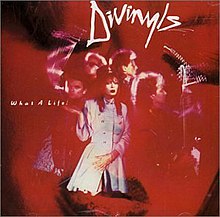What a Life! (album)
| What a Life! | ||||
|---|---|---|---|---|
 |
||||
| Studio album by Divinyls | ||||
| Released | 1985 | |||
| Recorded | 1983-1985 | |||
| Genre | Rock, new wave, pub rock, pop rock | |||
| Length | 40:00 | |||
| Label | Chrysalis | |||
| Producer | Mike Chapman, Gary Langan, Mark Opitz | |||
| Divinyls chronology | ||||
|
||||
| Singles from What a Life! | ||||
|
||||
| Professional ratings | |
|---|---|
| Review scores | |
| Source | Rating |
| AllMusic | |
What a Life! is the second studio album by Australian band Divinyls, released in July 1985 by Chrysalis Records. The album is a genre of rock and new wave songs—written by Divinyls members Christina Amphlett and Mark McEntee.
After touring and promoting in the United States, Divinyls came back to Australia to begin the follow-up to Desperate, with Mark Opitz producing again. They produced three songs including "Don't You Go Walking" and "Motion" but Amphlett and McEntee were not satisfied so they returned to the road, replacing drummer Richard Harvey with J.J. Harris, and wrote more songs. A year later they again tried recording, this time with the producer Gary Langan who was the founding member of the band Art of Noise. He brought a sophisticated, high-tech edge to Divinyls' sound, but a full album failed to get done. Recording stopped once more.
Eventually, Amphlett and McEntee made a journey to Los Angeles, where they asked pop producer Mike Chapman to come back with them to Australia and finish their second album. Chapman ended up producing only two songs: "Pleasure and Pain" (which he also co-wrote with Holly Knight) and "Sleeping Beauty". The album was released almost two years after recording began. It reached No.4 in Australia and No.91 in the US, while "Pleasure and Pain" hit No.11 in Australia and the lower reaches of the Top 100 in the US. Two later singles, "Sleeping Beauty" and "Heart Telegraph", charted moderately in Australia but did little in the US. Despite its Australian success, Chrysalis declared the album a failure.
Rolling Stone described the music as "loud and hard-edged, as purely physical as any metal band, but tempered with ... swaggering rowdiness". Ram magazine noted the band's writing had a newfound maturity, "verbalising adult fears and lingering adolescent yearnings".AllMusic's later review said many of the album tracks were hardly memorable and that the band's best strengths lay both in Amphlett's unique vocal delivery, and McEntee's bottom-heavy, grungy, guitar work.
...
Wikipedia
